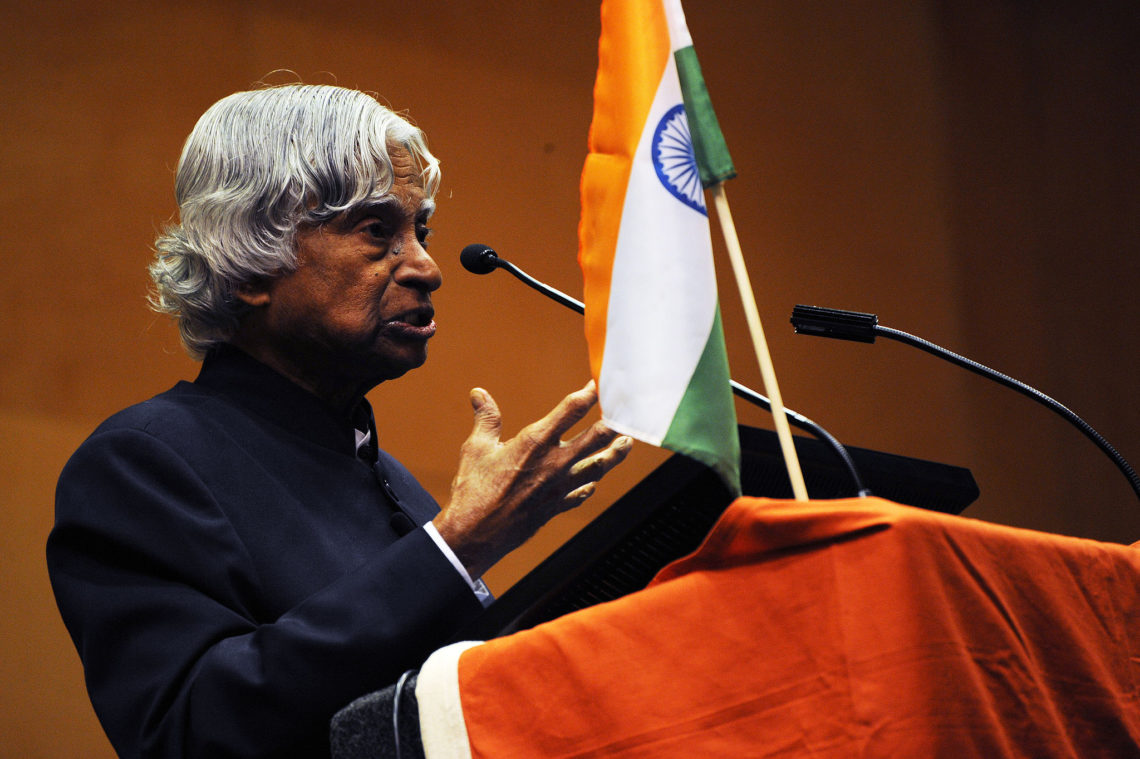APJ Abdul Kalam was given many titles but it was “the People’s President” that described him best. Elected the 15th President of India, Abdul Kalam was known for his robust interactions with students that left us with nuggets like “the world is trying to make you like everybody else but the question is – whether you want to be you or everybody else”. His speeches at schools and universities have been read, viewed, and reshared millions of times and almost a decade after his passing, APJ Abdul Kalam still inspires the people of India who often look to his accomplishments in the field of aerospace as a source of encouragement and inspiration.
Abdul Kalam’s birth anniversary, October 15th, is celebrated as World Student Day in honor of the former President of India. In schools across the country, students and teachers hold quizzes, debates, essay writing and artistic competitions each with a theme that centers on the potential of students for India’s future. Holding APJ Abdul Kalam as an example, students and young adults throughout India use this day to identify their dreams and work toward them.
“A dream is not that which you see while sleeping; it is something that does not let you sleep.”
Here are 5 lessons in humanity from APJ Abdul Kalam:
Humility
It is said that Abdul Kalam entered Rashtrapati Bhavan with two small suitcases and departed after his term ended – with the same two small suitcases. Abdul Kalam is known for being humble and despite his distinguished career and stellar accomplishments, he could often be seen excitedly conversing with the average citizen who wanted to hear his thoughts on different subjects. These characteristics were admired by Indians and people from around the world who often remarked and wrote about the simple and humble appearance, demeanor and manner of speech of this former ISRO Project Director who had a prime role in the development of the country’s missile and nuclear weapons programs.
“I reminded myself that the best way to win was to not need to win.”
Love for Children
APJ Abdul Kalam recognized the promise and potential in children and young people in shaping and building the future of India. He is known for spending time interacting with children and made it one of his personal priorities to deliver speeches, write books and spark conversations with the purpose of inspiring the minds of the youth of India and the world. He often interacted with teachers and when he did, he reiterated their important role in shaping the minds of children and youngsters. During one such interaction with teachers and students, he famously wrote a poem-song for the young people of India called the Song of Youth which is used by schools and organizations to this day.
“Let us sacrifice our today, so that our children can have a better tomorrow.”
Perseverance
The architect of India’s missile program is famous for having studied under street lights when he was a child growing up in Rameswaram in Tamil Nadu. This reflected his solid focus on ambition despite obstacles such as poverty and the lack of financial or academic support. To help his struggling family, a ten year old Abdul Kalam worked as a newspaper boy and would walk 3 kilometers from Rameswaram Road Railway Station and then distribute them to people around town. Though he dreamed of becoming a fighter pilot and narrowly missed his chance to join the Indian Air Force, he persevered and set his sights on another passion of his: aeronautical engineering.
“Never stop fighting until you arrive at your destined place.”
Serving the Poor
From a poor background, Abdul Kalam witnessed firsthand the struggles and challenges of people in poor and rural households. For this reason, Abdul Kalam and cardiologist Bhupathiraju Somaraju developed a low-cost coronary stent called the Kalam-Raju Stent which is India’s first indigenous coronary stent. The purpose of developing the device was to make it affordable to the common man and thousands were implanted and used. But this doctor-scientist duo didn’t stop there. The team went on to create an affordable tablet to be used by healthcare workers called the Kalam-Raju Tablet. The aim of creating this tool was to help healthcare workers in rural areas perform basic tasks for the people.
“I can give my hand to someone who needs help.”
Collective Good
With an academic and professional foundation that included Madras Institute of Technology, DRDO, INCOSPAR and ISRO, APJ Abdul Kalam could have chosen to apply his skills to an organization for immense financial profit. Instead, the Missile Man of India dedicated his knowledge, research and capabilities in service to developing the Indian defense system and inspiring generations of Indians in the process. Focusing instead on the collective good, he used his position as a national and global figure to promote education amongst the youth of India and remind them again and again of their importance to the future. He valued success but only when it is used to make a positive impact on the lives of others.
“Be more dedicated to making solid achievements than in running after swift but synthetic happiness.”
The legacy of APJ Abdul Kalam
On July 27, 2015 at Indian Institute of Management in Shillong, APJ Abdul Kalam passed away doing what he loved best – sharing his wisdom and knowledge with students whom he cherished, trusted and in whose hands, he placed the future of India. Other than individuals, there are non profit organizations across India that reflect the values and ideals of APJ Abdul Kalam. Learn more about these organizations and lend your support to achieve their aims in the spirit of progress and development:
–
Give’s mission is to “make giving bigger and better.” Give is the most trusted donation platform in India for fundraisers and crowdfunding campaigns. Through our technology solutions, we enable individuals and organisations to fundraise and donate to a cause, charity or NGO with trust and convenience. Give’s community of 2.7M+ individual donors and 300+ organisations supports 3,000+ verified nonprofits with 80G deduction and serves 15M+ people across India. Find a fundraiser today!

Shirley has been in the development sector for over 10 years and is passionate about making a change in the world around her, including adopting dogs and writing to make a difference.
Discover more from
Subscribe to get the latest posts sent to your email.

